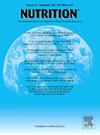植物乳杆菌TCCC11824通过调节小鼠和临床患者的NF-κB-HMGCR通路和肠道菌群发挥降血脂和抗肥胖作用
IF 3.2
3区 医学
Q2 NUTRITION & DIETETICS
引用次数: 0
摘要
高脂肪饮食(HFD)与肥胖、高脂血症和心血管疾病的发病率之间存在着密切的联系,影响到越来越多的个体。越来越多的研究表明,益生菌和肠道菌群在宿主的饮食吸收、代谢和整体健康中起着重要作用。本研究旨在探讨植物乳杆菌TCCC11824 (CGMCC 8198)对小鼠和人类高脂血症和肥胖症的治疗作用及其机制。首先,在用植物乳杆菌TCCC11824治疗5周的小鼠中,hfd诱导的高脂血症和肥胖症出现了剂量依赖性改善,从而恢复了肠道微生物群的平衡。进一步说明植物乳杆菌TCCC11824细胞裂解液可直接对油酸诱导的肝细胞脂肪变性发挥保护作用,并通过抑制NF-κB通路调节HMGCR的表达。重要的是,植物l.c artarum TCCC11824改善了高脂血症患者血液和粪便检测中高脂血症指标的表达,抑制短链脂肪酸(SCFAs)的合成。综上所述,L. plantarum TCCC11824通过NF-κB调控HMGCR及调节肠道菌群发挥抗高脂血症和抗肥胖作用,具有作为治疗高脂血症和肥胖症的膳食补充剂的潜力。本文章由计算机程序翻译,如有差异,请以英文原文为准。
Lactiplantibacillus plantarum TCCC11824 exerts hypolipidemic and anti-obesity effects through regulation of NF-κB-HMGCR pathway and gut microbiota in mice and clinical patients
A strong association exists between the high-fat diet (HFD) and the incidence of obesity, hyperlipidemia and cardiovascular disease, affecting an increasing number of individuals. More and more research has shown that probiotics and gut microbiota play important roles in dietary absorption, metabolism, and general health of the host. This aim of this study was to evaluate the therapeutic effects and the underlying mechanisms of Lactiplantibacillus plantarum TCCC11824 (CGMCC 8198) on hyperlipidemia and obesity in mice and humans. First, there was a dose-dependent improvement in HFD-induced hyperlipidemia and obesity in mice that had been treated with L. plantarum TCCC11824 for 5 wk, thus restoring the balance of the gut microbiota. Furthermore, it showed that cell lysate of L. plantarum TCCC11824 could directly exhibit protective effects on the hepatocyte steatosis induced by oleic acid, and regulate the expression of HMGCR by inhibiting the NF-κB pathway. Importantly, L.plantarum TCCC11824 ameliorated the expression of indicators of hyperlipidemia and inhibited the synthesis of SCFAs (short-chain fatty acids), as shown by blood and fecal tests in hyperlipidemic patients. In summary, L. plantarum TCCC11824 exerts anti-hyperlipidemic and anti-obesity effects through the regulation of HMGCR via NF-κB and modulating gut microbiota, indicating its potential as a dietary supplement for the treatment of hyperlipidemia and obesity.
求助全文
通过发布文献求助,成功后即可免费获取论文全文。
去求助
来源期刊

Nutrition
医学-营养学
CiteScore
7.80
自引率
2.30%
发文量
300
审稿时长
60 days
期刊介绍:
Nutrition has an open access mirror journal Nutrition: X, sharing the same aims and scope, editorial team, submission system and rigorous peer review.
Founded by Michael M. Meguid in the early 1980''s, Nutrition presents advances in nutrition research and science, informs its readers on new and advancing technologies and data in clinical nutrition practice, encourages the application of outcomes research and meta-analyses to problems in patient-related nutrition; and seeks to help clarify and set the research, policy and practice agenda for nutrition science to enhance human well-being in the years ahead.
 求助内容:
求助内容: 应助结果提醒方式:
应助结果提醒方式:


